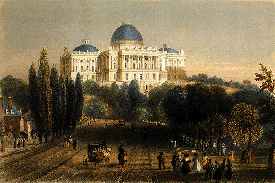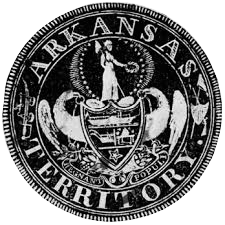Related Research Articles

The 19th United States Congress was a meeting of the legislative branch of the United States federal government, consisting of the United States Senate and the United States House of Representatives. It met in Washington, D.C. from March 4, 1825, to March 4, 1827, during the first two years of the administration of U.S. President John Quincy Adams. The apportionment of seats in the House of Representatives was based on the Fourth Census of the United States in 1820. The Senate had a majority of Jackson Men, while the House had an Anti-Jackson (pro-Adams) majority.
The Regents of the University of Michigan, sometimes referred to as the Board of Regents, are constitutional officers of the U.S. state of Michigan who collectively form the governing body of the University of Michigan, comprising the campuses at Ann Arbor, Flint, and Dearborn. The Board of Regents was first created by legislative act in 1837, and the Regents as a body corporate have been defined in the Constitution of Michigan since 1850. There are eight regents, two of whom are elected to an eight-year term by statewide ballot every two years, plus the President of the University of Michigan, who serves ex officio but does not vote.

The 1st Michigan Legislature, consisting of the Michigan Senate and the Michigan House of Representatives, met in Detroit in three sessions between November 2, 1835, and July 26, 1836, during the first year of Stevens T. Mason's governorship of the (prospective) state.
Laurent Durocher was an American judge and politician in the U.S. state of Michigan. He was involved in the formation of Monroe County, Michigan, and held numerous official posts during the first decades of its existence, and was also a member of both the Michigan House of Representatives and Michigan Senate.
Charles Chandler Hascall was an American newspaper publisher and politician. He served in the Michigan Senate during its first session after adoption of the state constitution.

The Sixth Michigan Territorial Council was a meeting of the legislative body governing Michigan Territory, known formally as the Legislative Council of the Territory of Michigan. The council met in Detroit in two regular sessions, one extra session, and one special session between January 7, 1834, and August 25, 1835, during the terms of George B. Porter and Stevens T. Mason as territorial governors.

The General Assembly of the Territory of Arkansas, commonly known as the General Assembly, was the legislature of the U.S. territory of Arkansas, from 1819 to 1835. The General Assembly was directly elected, albeit on a restricted franchise. Its legislative power was subject to veto by the appointed Governor.
The Michigan Territorial Council, known formally as the Legislative Council of the Territory of Michigan, was the legislative body of the Territory of Michigan from 1824 to 1835, when it was succeeded by the Michigan Legislature in anticipation of Michigan becoming a U.S. state. A session of the council including only members from what would become Wisconsin Territory met in 1836.

The Fifth Michigan Territorial Council was a meeting of the legislative body governing Michigan Territory, known formally as the Legislative Council of the Territory of Michigan. The council met in Detroit in two regular sessions between May 1, 1832, and April 23, 1833, during the term of George B. Porter as territorial governor.
The Fourth Michigan Territorial Council was a meeting of the legislative body governing Michigan Territory, known formally as the Legislative Council of the Territory of Michigan. The council met in Detroit in two regular sessions between May 11, 1830, and March 4, 1831, during the terms of Lewis Cass and George B. Porter as territorial governor.
The Third Michigan Territorial Council was a meeting of the legislative body governing Michigan Territory, known formally as the Legislative Council of the Territory of Michigan. The council met in Detroit in two regular sessions between May 5, 1828, and November 5, 1829, during the term of Lewis Cass as territorial governor.
The First Michigan Territorial Council was a meeting of the legislative body governing Michigan Territory, known formally as the Legislative Council of the Territory of Michigan. The council met in Detroit in two regular sessions between June 7, 1824, and April 21, 1825, during the term of Lewis Cass as territorial governor.
William Henry Puthuff, also spelled Puthoff, was an American soldier, businessman, and politician who served in the War of 1812 and occupied a number of government positions in the Territory of Michigan. In his role as Indian agent at Michilimackinac, he engaged in a multi-year conflict with John Jacob Astor and his American Fur Company. He was a member of the First Michigan Territorial Council and died while attending its first session.

Hubert Lacroix or Le Croix was an American soldier, trader, and politician who fought in the War of 1812. He was captured by the British following the surrender of Detroit and saved from charges of treason by his friend, the Shawnee chief Tecumseh. Lacroix later served two terms as a member of the Michigan Territorial Council.
Wolcott Lawrence was an American jurist, businessman, and politician who served multiple terms on the Michigan Territorial Council.
Joseph Miller was an American pioneer and politician who served on the Michigan Territorial Council in 1825.
The 1823 Michigan Territorial Council election was held in the Territory of Michigan to elect the members of the territory's newly-formed legislative council.
The 1825 Michigan Territorial Council election was held in the Territory of Michigan to elect the members of the territory's legislative council.

The 46th Massachusetts General Court, consisting of the Massachusetts Senate and the Massachusetts House of Representatives, met in 1825 and 1826 during the governorship of Levi Lincoln Jr. Nathaniel Silsbee served as president of the Senate and Timothy Fuller served as speaker of the House.
The 47th Massachusetts General Court, consisting of the Massachusetts Senate and the Massachusetts House of Representatives, met in 1826 and 1827 during the governorship of Levi Lincoln Jr. John Mills served as president of the Senate and William C. Jarvis served as speaker of the House.
References
- Journal of the Legislative Council of the Territory of Michigan: First Session—Second Council, Monroe, Michigan: Edward D. Ellis, 1826, retrieved 2019-10-04– via HathiTrust
- Journal of the Legislative Council of the Territory of Michigan: Second Session—Second Council, Monroe, Michigan: Edward D. Ellis, 1827, retrieved 2019-10-04– via HathiTrust
- Legislative Council, State of Michigan (2017), Michigan Manual (2017–2018 ed.), Lansing: Legislative Service Bureau, ISBN 1-878210-06-8 , retrieved 2019-10-04
- State of Michigan (1874), Laws of the Territory of Michigan, 2, Lansing: W. S. George, retrieved 2019-10-04